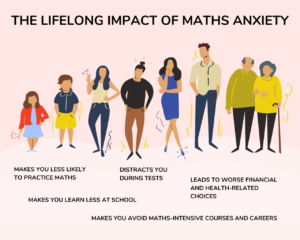New evidence suggests that mathematics anxiety is not only related to lower exam grades, but it also interferes with the process of learning, leading to cumulative gaps in knowledge – but when does this process start and what can teachers and parents do?
Maths anxiety is the feeling of tension and fear that many people experience in response to having to do mathematics and, sometimes, to the mere prospect of working out a sum. Negative thoughts (worry, anticipation of failure), unpleasant affective states (fear), and even somatic reactions (such as butterflies in the stomach) may characterise maths-anxious individuals, not only during maths classes, but also in many everyday situations in which numbers or maths are involved. Much is known already about the extent to which maths anxiety can interfere with mathematics performance and achievement at school and beyond. In our study, we sought to take a step further, and understand whether maths anxiety may not only affect children’s performance in standardized tests and exams, but also interferes with their ability to learn new concepts and procedures during regular maths classes.

Maths anxiety and maths performance are closely intertwined
Although some people are more anxious by disposition than others, and females tend to be more anxious in general than males, mathematics anxiety is a specific form of anxiety about doing mathematics. Moreover, the relationships between the experience of mathematics anxiety and people’s ability to do mathematics are complex and involve a multitude of processes.
On the one hand, maths anxiety triggers negative thoughts (“I’m not good at maths”), and distracts individuals by making them continuously worry about their ongoing performance (“am I doing well enough?”; “will I be able to finish on time?”). Such intrusive thoughts consume cognitive resources, which can interfere with the successful completion of tasks. Moreover, accessing complex knowledge that is stored in long-term memory is more difficult under stressful conditions. The consequence is the well-known experience of having one’s mind go blank.
On the other hand, low ability in maths – starting from the basic foundations of maths competence – predisposes students to repeated failures that progressively undermine their confidence with numbers, and makes them associate maths with unpleasant experiences. Experiencing negative outcomes and anxiety in relation to maths, in turn, prompts students to minimize their involvement with the subject in the long run (for example, by opting out of non-compulsory maths classes and avoiding maths-intensive courses and careers). Another consequence is for maths anxious people to also avoid maths and numbers in their daily life and when making everyday decisions (for example, about their finances or health-related behaviour). Although much of these findings come from research with older students and adults, there is evidence that maths anxiety and maths performance are negatively associated already in the first school years.
Why should maths anxiety also affect maths learning?
Much of the research conducted thus far has focused on students’ and adults’ performance on standardized maths tests, arithmetic tasks, or daily life problems involving maths knowledge. Typically, these tasks require individuals to retrieve knowledge and procedures which have been acquired and consolidated in the past, and to apply them to current tasks. Much less attention has been dedicated to the actual learning process, that is, the process that typically occurs at school and that allows students to obtain information, and acquire procedures and abilities that they did not have in the past. Neuro-physiological studies suggest that memory processes under stress – which is the typical experience of maths-anxious students in a maths class – are remodulated in ways that make it more difficult to encode complex concepts, focus on details, and integrate new information into past knowledge structures. Because learning mathematics requires effortful elaboration and step-by-step integration of new information into existing bases of knowledge, it is arguable that anxiety experienced during maths classes (for example, when teachers explain new maths contents or when students are working on some practice exercises) may harm students’ ability to acquire novel maths knowledge. In case this process is present from the very early stages of mathematics learning, students with anxiety could accumulate significant gaps in their knowledge over the school years.

What we did in our study
We carried out two studies with 115 primary school children in Italy (Study 1) and 120 in Northern Ireland (Study 2). In both studies, children were aged 6 years. We focused on this age group, because previous studies suggested that by the age of 6, children are able to report the level of anxiety that they experience in relation to mathematics. We also decided to run the study in two different educational contexts, in order to be able to assess the robustness of our findings. The most important difference between the two school systems is that at the age of 6, children in Northern Ireland are already attending the 3rd primary school grade, whereas children in Italy are enrolled in the 1st grade of school.
Children who participated in the study were involved in two sessions, 7-days apart, which they completed in pairs or triads. In the first session, the children were introduced to maths contents and procedures that had not been part of their school curriculum up to that time. The contents and the training procedures were piloted separately in both countries to make sure that children were not familiar with the contents before the study, and that the training procedures and materials were appropriate, given the children’s level of knowledge. As children in Northern Ireland were at a more advanced stage of their mathematics education, the study materials developed for them were also more challenging.
The novel contents that the children received training in were addition with tens (in Italy only), the principle of order invariance of addends (in both countries), and using the lesser than/greater than symbols (in Northern Ireland only). Children’s knowledge of these contents was assessed immediately before the teaching session, immediately after the teaching session, and one week later. Children’s maths anxiety was also assessed with an age-appropriate scale, in which children were asked how much anxiety they felt in situations involving maths (e.g., “when using the number line”, or “when you are taking a maths test at school”). In Study 2, we also assessed children’s working memory to be able to investigate the effects of individual differences in cognitive ability.
What we found
To some extent, many children had some knowledge of the contents we taught even before our teaching session, which confirms that children acquire a lot of their mathematical knowledge informally. We also found that children’s knowledge improved on all contents after the teaching session, and their proficiency remained stable after a one-week delay. Importantly, both initial knowledge and subsequent improvements were found to be negatively related to maths anxiety, which indicated that children with maths anxiety not only had slightly less initial knowledge of the contents that we focused on in our study, but they also learnt less from the teaching sessions.
Our main analyses involved using longitudinal structural equation models. This technique allowed us to estimate the contribution of maths anxiety to changes in children’s task scores from the baseline to the immediate post-training assessment, and then from the immediate post-training to the delayed assessment (one week later), while also taking into account the child’s performance on the previous assessment. Using these analyses, we were able to demonstrate that children who were more anxious about maths – regardless of their initial knowledge of the contents – learnt less during the teaching sessions, and their disadvantage persisted seven days later. Specifically, we found that maths anxiety reduced learning about the order invariance of addends in the Italian sample, and about the lesser than/greater than symbol in the case of children from Northern Ireland, which were the two topics that children had the least knowledge about at the start of the study. With regard to the effect of cognitive ability, no relation emerged between maths anxiety and children’s working memory capacity, which indicated that the effect of maths anxiety was present regardless of children’s ability levels.
What are the implications for teachers and parents?
These findings have important implications at the practical level. First of all, they suggest that the impact of maths anxiety on maths performance may be much worse than we previously thought. Research has already established that maths anxiety interferes with pupil’s ability to dedicate their cognitive resources to solving maths problems, makes them less likely to spend time on maths tasks and use their maths knowledge in daily life situations, and it also leads them to avoid maths-intensive courses and careers. Now we also know that maths-anxious pupils benefit less from teaching sessions and other opportunities to expand their knowledge base.
From the teacher’s perspective, this evidence suggests that signals of discomfort – if not overt fear – from students should be taken into account and should invite intervention. Structuring the learning environment in ways that enhance students’ sense of mastery and highlight the value of maths is especially important. Because previous experience of success in maths boosts students’ confidence and lowers their anxiety, teachers should make sure to focus students’ attention on past instances where they successfully overcame challenges in their maths learning. It is also important for teachers to promote a classroom climate in which errors and failures are framed as opportunities for improvement. Finally, teachers should be aware of their own feelings toward maths. Research suggests that, starting from the earliest school grades, pupils learn less from maths-anxious teachers, and they also follow their teachers in developing negative feelings towards maths.
A second important implication of our study concerns the age of the children. We examined maths learning in six-year-olds. If anxiety hinders learning at such a young age, it is arguable that children who are more anxious about maths starting from the early school years may develop gaps in their basic knowledge of maths, which expands over time, triggering a vicious circle between lack of competence and negative feelings about maths. Teachers should therefore be aware of their pupils’ maths anxiety starting from the early school years, but parents should also take notice. In our Italian sample, children were attending their first semester at school, which means that they had very little opportunity to experience failure in maths in a school setting. Nevertheless, some children already displayed moderate levels of anxiety, and those who did, also learnt less from the maths training provided by us. This finding was very similar to what happened to the pupils in Northern Ireland who were already attending their 3rd school grade.
It is evident that negative feelings about maths can be acquired before children start school – through interactions with family members, and due to influences from the media and the broader cultural environment. Nevertheless, parents can do a lot to help children to develop more positive attitudes and feelings toward maths. They can involve children in playful, informal ways of using maths at home (e.g., while cooking or by playing board games), and may also encourage them to play maths games, for example, by using some computer or mobile phone apps that can offer a motivating, attractive and non-judgmental environment for practicing essential maths skills, starting from the early years.
Limitations and future directions
Our study has some limitations. For example, even though we sought to reproduce an ordinary teaching session that introduces a novel maths topic, our experimental setting diverged from the typical classroom learning environment. In particular, it is unusual for pupils to attend a teaching session in groups of two or three students, and to be taught by an unfamiliar person. These differences may limit the generalizability of our findings to ordinary school settings. We also did not find an effect of maths anxiety on the learning of all contents, so it is possible that the effect is stronger when a topic is quite unfamiliar. We also focused on a single age group, which means that we do not know whether the strength of the effects of maths anxiety on maths learning may increase or decrease as the children get older.
Regardless of some caveats, this study clearly highlights that maths anxiety may have a powerful impact on children’s learning of maths, starting from the first school years. Efforts to develop positive attitudes and feelings towards mathematics should therefore start at the onset of schooling, and, ideally, even earlier.




This is a nice indication that pre-existing anxiety can kick in from the time that some new teaching/learning starts. But surely that leaves us needing to find out more about how a teacher might detect that anxiety in an individual and, then, what kinds of practical intervention smooth the journey forward.
Typically, maths anxiety is measured by self-report questionnaires. There are questionnaires which can be used with young children as well. For example, the scale described in this paper: https://www.frontiersin.org/articles/10.3389/fpsyg.2020.01014/full
In this article, you can find a few tips on how maths anxiety could be reduced, although, of course this is a complicated issue and each person may have a different reason for developing maths anxiety: https://theconversation.com/what-a-fear-of-maths-does-to-children-new-research-150108